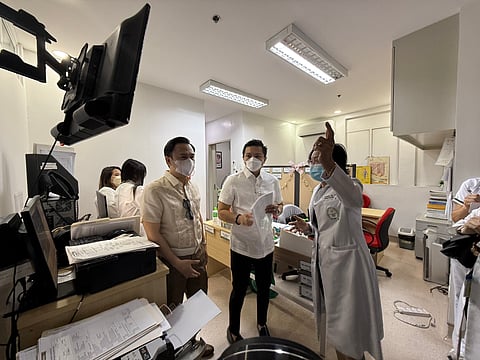
- NEWS
- the EDIT
- COMMENTARY
- BUSINESS
- LIFE
- SHOW
- ACTION
- GLOBAL GOALS
- SNAPS
- DYARYO TIRADA
- MORE

Good skin days are now within reach for more Filipinos, thanks to a heartfelt partnership between the Rotary Club of New Manila East (RCNME) and its sister club, the Rotary Club of Daejeon Jungdo from South Korea.
On 15 July 2025, the two clubs turned over P4.1 million worth of medical equipment to the Quirino Memorial Medical Center (QMMC), giving a much-needed boost to the hospital’s dermatology services.
The donation, made possible through twin Rotary Global Grants, includes an excimer laser and a fluorescence LED microscope — both considered game changers in treating skin conditions like psoriasis and vitiligo. These will also serve as training tools for QMMC’s dermatology residents, helping the next generation of doctors sharpen their expertise.
For QMMC’s Department of Dermatology chair Dr. Hildegarde Cabrera, the donation was more than just about cutting-edge machines.
“These devices will help us provide better care to underserved patients and strengthen QMMC as an advanced dermatologic care center. We are overjoyed and grateful, not just for the machines, but for the partnership, the trust, and the hope they represent,” she said.
With the new equipment, over 7,000 patients every year are expected to benefit, according to the Philippine Dermatological Society president, Dr. Jasmin Jamora.
RCNME president Karlo Benjamin Nisce explained that the project reflects Rotary’s mission to expand access to healthcare.
The event also highlighted the friendship between the Philippines and South Korea, as the delegation from the Rotary Club of Daejeon Jungdo flew in to personally attend the ceremony.
Both clubs also co-funded a liver ultrasound machine for Daejeon University Hospital in South Korea, showing the “twin” spirit of the global grant that strengthens not just hospitals but also international goodwill.
Thanks to this initiative, QMMC now stands alongside major institutions like the Philippine General Hospital and the Research Institute for Tropical Medicine in offering advanced dermatologic diagnostics for indigent patients.
